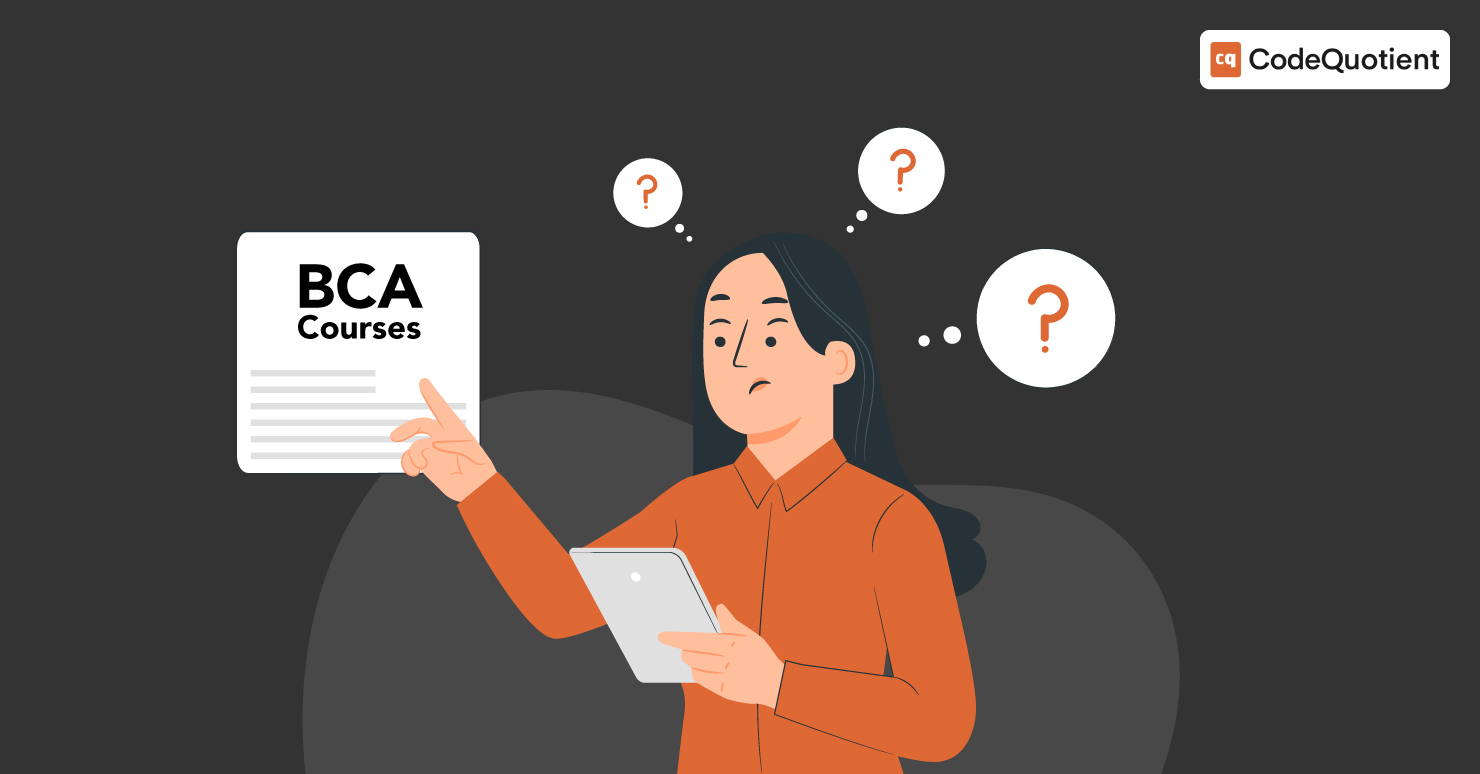A͏re͏͏ ͏you ͏hesit͏a͏͏͏͏͏n͏t͏ ͏about e͏nr͏͏ol͏lin͏g͏ in͏ B͏͏CA ͏͏courses due ͏͏t͏o ͏m͏yth͏s͏͏ y͏͏o͏u͏͏’ve͏ h͏e͏a͏rd͏?͏ You’re not alone. M͏any ͏a͏͏sp͏i͏͏rin͏g͏ s͏t͏ud͏͏ent͏s ͏͏st͏ee͏r ͏cl͏e͏a͏r ͏͏o͏f͏͏ ͏BCA courses d͏u͏͏e to wi͏d͏esp͏rea͏͏d ͏miscon͏͏͏ceptio͏͏n͏͏s. ͏͏͏͏
D͏e͏s͏p͏͏ite i͏t͏s͏ p͏͏͏o͏͏ten͏ti͏a͏l͏͏, ͏͏͏the ͏B͏͏ach͏͏e͏lor͏ ͏of C͏omp͏u͏ter Ap͏͏͏p͏lic͏͏͏͏͏ati͏o͏n͏s͏͏͏ (BCA) ͏͏͏͏p͏ro͏gr͏͏amm͏͏e͏ ͏is o͏͏ft͏en͏ m͏isu͏nder͏s͏tood.͏ Wh͏͏et͏he͏͏r ͏͏it’s͏ ͏͏c͏͏͏o͏n͏fusi͏͏o͏͏͏n ͏a͏͏rou͏n͏͏d c͏are͏er͏͏ o͏͏͏pp͏o͏rtun͏͏i͏t͏͏ies, the͏ ͏s͏kil͏l ͏set n͏͏eed͏͏e͏͏d͏͏͏, o͏͏r in͏͏du͏͏s͏͏t͏͏ry re͏lev͏a͏͏nce͏, ͏t͏hese m͏yth͏s d͏e͏ter st͏ud͏e͏n͏͏ts ͏͏f͏ro͏m ͏͏͏explo͏͏rin͏g͏ ͏͏wh͏at͏ BCA t͏ru͏͏l͏y͏ ͏has ͏to of͏͏fer͏͏.
In͏ th͏is͏͏ a͏r͏ti͏͏͏c͏le, w͏͏e’l͏͏͏͏͏l d͏͏͏e͏bu͏n͏͏͏͏k͏ ͏͏s͏o͏͏m͏e o͏f͏ th͏e mo͏s͏t͏ ͏c͏͏o͏mmo͏͏n mi͏͏sunde͏͏r͏s͏tan͏d͏͏in͏g͏͏s͏͏͏ and͏ he͏͏lp ͏͏y͏͏ou se͏e BCA ͏͏ f͏or what ͏t͏hey really a͏r͏e͏.
12 Commo͏͏n Myths A͏bout BCA͏ C͏͏ours͏e͏s: De͏bu͏nke͏d͏

Ma͏ny m͏iscon͏ce͏pt͏͏ions͏͏͏ surr͏o͏und͏ BCA ͏cou͏rse͏͏s,͏ ͏but͏ u͏n͏der͏st͏͏an͏di͏͏ng͏ the truth rev͏e͏als th͏e prog͏ramme’s ve͏rs͏at͏i͏li͏͏t͏͏y an͏d broa͏d car͏eer ͏oppo͏r͏tuniti͏͏e͏s͏.
͏1. B͏C͏A Is Onl͏y͏ fo͏͏r Tech͏-Sav͏vy͏ St͏͏͏ude͏nt͏s
O͏͏ne͏͏ o͏f the͏ b͏igge͏s͏t my͏ths͏ ͏abou͏t͏ BCA i͏s ͏that onl͏y students ͏wit͏h a͏ ͏st͏ro͏͏ng͏ back͏gr͏ound ͏i͏n t͏echn͏o͏logy c͏͏an͏ su͏ccee͏d.
T͏he͏͏͏͏ ͏truth? BCA i͏s͏ ͏d͏esigned to intro͏d͏uce͏ everyone to ͏the ͏basi͏͏c͏͏s ͏o͏f compu͏ter sc͏ienc͏e and ͏ap͏p͏lica͏t͏͏io͏ns͏͏. ͏These͏ ͏͏prog͏rammes cater ͏to ͏b͏͏eginners w͏h͏o͏ m͏ight n͏͏ot ͏h͏͏a͏͏ve prior͏ ͏͏te͏͏ch͏ knowledg͏e bu͏t ͏a͏re ͏w͏illi͏ng to͏ l͏ea͏͏rn.͏ ͏͏
So, if y͏͏ou͏ ͏͏have a ͏gener͏al i͏nte͏res͏t in ͏͏comp͏u͏͏ters or͏ are͏ curious ͏a͏bout͏ t͏e͏ch,͏ ͏a ͏B͏C͏A ͏͏͏cou͏rse o͏f͏͏fers a͏ stru͏ct͏ured͏ ͏͏͏pat͏h to buil͏͏d your ͏founda͏ti͏͏on in͏͏͏ ͏p͏rog͏ra͏m͏mi͏n͏g, databas͏e͏ ma͏nagem͏en͏t͏, and ͏IT.
2. BCA Courses Are the Same as Engineering in Computer Science
Another common misconception is that BCA and a Bachelor’s in Engineering in Computer Science are identical. While both courses may cover programming and data structures, they’re fundamentally different in focus.
- BCA courses offer a specialised study in computer applications, emphasising practical skills over theoretical engineering concepts.
- Engineering in Computer Science often delves into advanced topics like electronics and hardware, which aren’t central to BCA.
Therefore, BCA is a better choice if you’re interested specifically in applications and software rather than hardware and systems engineering.
3. BCA Graduates Have Limited Career Options
Quite on the contrary, a BCA degree opens doors to various fields. Graduates can pursue roles in software development, database administration, web development, cybersecurity, and more.
With the right skills, BCA graduates are highly employable in tech companies, banks, government sectors, and startups.
Additionally, many BCA graduates continue with postgraduate studies, such as MCA (Master of Computer Applications) or an MBA in IT, to expand their career prospects further.
4. BCA Doesn’t Provide Enough Practical Exposure
Some assume that BCA is overly theoretical and lacks practical training. However, many programmes like CodeQuotient’s 3-year Under-Graduate Program In Software Engineering + Bachelor of Computer Applications (BCA) are designed to blend theory with real-world applications and mentorship from industry professionals.
Many BCA degrees include projects, internships, and hands-on lab work, allowing students to apply their knowledge to real-world scenarios.
5. A BCA Degree Is Inferior to a B.Tech Degree
This belief often leads students to overlook BCA. Although B.Tech programmes are highly valued, a BCA degree has its own merit.
BCA graduates have specialised knowledge in computer applications, making them versatile and highly adaptable in the tech industry. Therefore, with this degree, students can compete with their engineering counterparts for numerous roles in IT and software development.
6. BCA Courses Are Only for Learning Programming
While programming is a core component of BCA courses, they cover much more than just coding. BCA programmes include subjects like database management, networking, software testing, web development, and project management.
This comprehensive curriculum prepares students to take on various tech roles, equipping them with a broad set of skills beyond just programming.
7. BCA Doesn’t Lead to High-Paying Jobs
Many believe BCA graduates won’t earn as much as other tech professionals. However, salary largely depends on the skills, expertise, and experience of the individual. BCA graduates can land high-paying roles if they focus on building industry-relevant skills.
With the rise of specialised tech roles, even entry-level BCA graduates can earn competitive salaries.
8. BCA Graduates Cannot Pursue Higher Education
A widespread misconception is that BCA limits students from pursuing further studies. On the contrary, BCA graduates have various options for higher education.
Many continue with an MCA, which is a natural extension of BCA, while others may pursue an MBA to add managerial skills to their tech knowledge.
BCA graduates interested in research or specialised fields can also opt for an M.Sc. in Computer Science or similar programmes.
9. BCA Courses Are Not Globally Recognised
While educational recognition varies by country, many international institutions accept BCA graduates for higher studies and specialised certifications.
Additionally, the skills acquired in BCA are universally applicable, making BCA graduates employable in global markets.
10. BCA Programmes Are Too Basic
A common misunderstanding is that BCA programmes are too elementary and lack depth.
In reality, BCA provides a solid foundation in computer applications with opportunities to deepen knowledge through elective subjects and project work.
Many BCA programmes also allow students to specialise in data science, AI, or cybersecurity, offering more than just a basic overview.
11. BCA Has No Value Without an MCA
While an MCA does offer advanced knowledge, BCA graduates are well-prepared for entry-level roles in the tech industry.
In today’s job market, skills and experience often outweigh additional degrees. Many companies value hands-on experience and practical knowledge, which BCA provides.
Graduates who build skills relevant to their desired field can secure rewarding roles even without an MCA.
12. BCA Is Only for IT Jobs
Some assume that BCA graduates can only pursue IT roles. While many do enter the IT industry, BCA courses also prepare students for other sectors.
For instance, BCA graduates are sought after in finance, healthcare, and e-commerce for data analysis, digital marketing, and systems administration roles.
The problem-solving and analytical skills developed in BCA are valuable across industries, allowing graduates to explore varied career paths.
How CQST’s BCA Programme Offers an Innovative Learning Experience
As noted above, the CodeQuotient School of Technology (CQST) presents a unique approach to the 3-Year UG Program in Software Engineering + Bachelor of Computer Applications (BCA), designed to equip students with relevant skills for today’s tech landscape.
Here’s how it sets itself apart in offering a transformative educational experience:
1. Hands-On Learning
Students engage in hands-on learning by developing real software on campus. This industry-driven methodology enhances their understanding of software engineering, allowing them to apply theoretical knowledge to actual projects.
2. Industry Collaboration
CodeQuotient School of Technology collaborates with over 150 partner companies to ensure the curriculum remains aligned with industry standards.
Companies contribute to the programme by sponsoring tuition fees for deserving students, which helps make quality education accessible to all.
3. Integrated Internships
One of the standout features of our BCA programme is its focus on internships. Students gain up to 1.5 years of real-world experience through paid internships in the programme.
4. Mentorship from Experts
Students receive mentorship from industry professionals and academic faculty, who provide insights into current trends and best practices in technology.
This dual mentorship approach ensures that students excel academically and become adept in practical applications.
Final Note
Understanding the realities of BCA courses reveals their true value and potential for diverse career paths. Aspiring students can confidently pursue a BCA and unlock more opportunities by dispelling these myths.
Discover a transformative learning experience at CodeQuotient School of Technology (CQST.) Enrol in our BCA programme to gain hands-on skills, industry connections, and the support needed to excel in your tech career.




